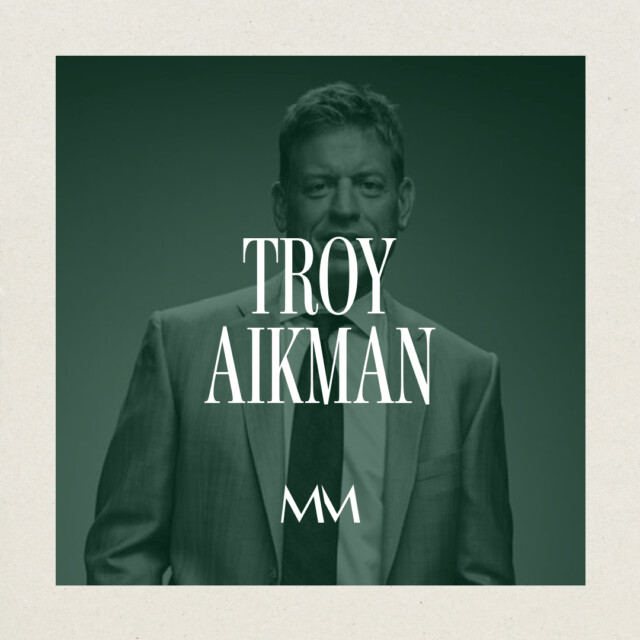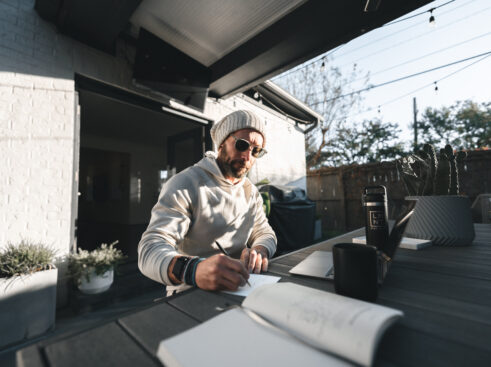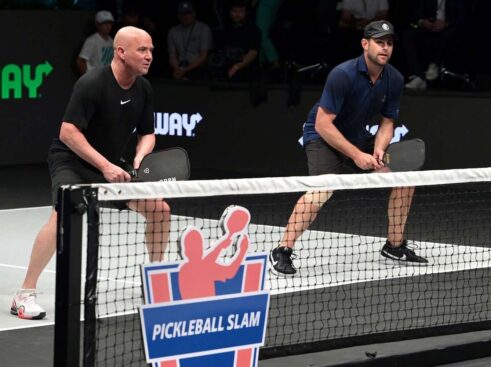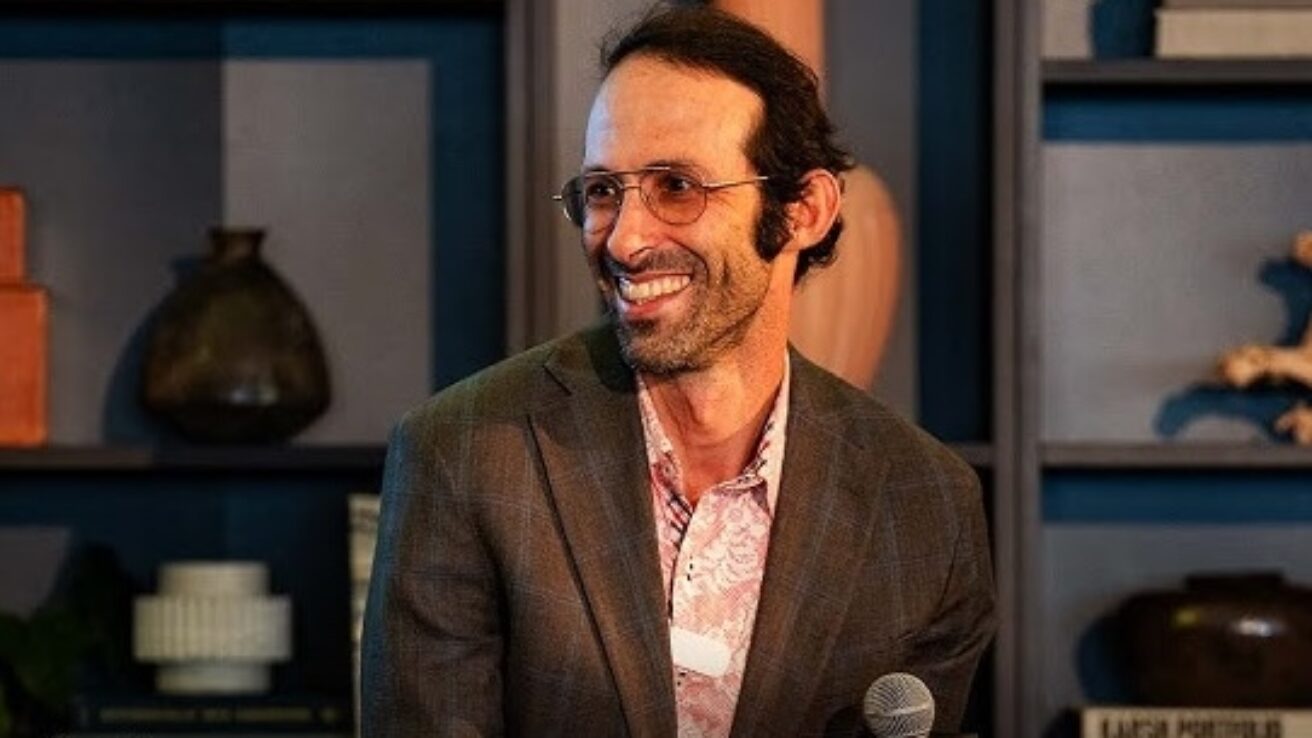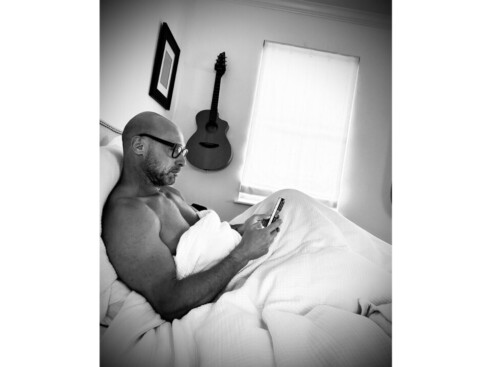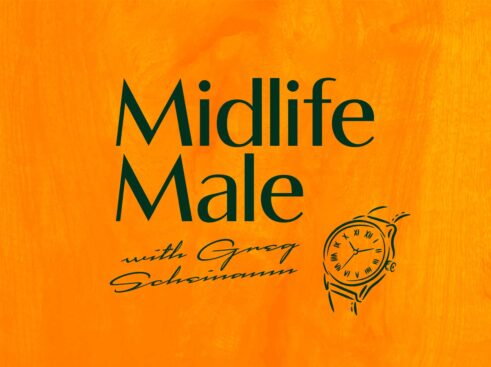The Eudemonia Summit is truly the gift that keeps on giving. A few months ago, I traveled to West Palm Beach for their inaugural event, not quite knowing what to expect. The lineup of speakers was remarkable, including Dr. David Rabin, founder of Apollo Neuro. I’d been testing the Apollo Neuro device for several months, so I reached out for an interview, and Dr. Rabin graciously accepted.
I’ll admit, I was skeptical at first. Apollo Neuro claims to help users unwind, focus, and sleep better through gentle vibrations delivered via a wearable device—on your wrist, ankle, or chest. It pairs with an app where you adjust the intensity based on your needs. As someone who deals with anxiety, I wondered if this was placebo or science. But over time, I realized something: wearing the Apollo and using the app when I need it most makes me feel better. It’s like having a silent companion to help self-regulate my emotional state.
Unlike other wearable tech that emphasizes tracking metrics—exercise, sleep scores, recovery—Apollo Neuro shifts the focus to less. It’s about intervention when you need it, helping you do less but with greater focus. That’s a refreshing philosophy in a space where too much tracking can add more stress.
There’s a balance we’re all trying to strike. On one side are the wellness basics: good sleep, nutrition, exercise. On the other is biohacking—cutting-edge devices and interventions. My curiosity lies in finding what really works versus what’s overkill. Apollo Neuro, in my experience, feels like it earns its spot.
Studies back this up. A double-blind study at the University of Pittsburgh showed significant improvements in heart rate variability (HRV), which measures how well your body handles stress. Over three months, users reported a 40% reduction in stress and anxiety. That hit home for me. Sleep data was equally compelling: users gained an extra 30 minutes of deep sleep per night on average—a huge win for anyone juggling work, family, and fitness.
Then there’s focus. A workplace study found users performed 25% better under stress. As a 52-year-old trying to manage life’s demands, that stat resonates. In my conversation with Dr. Rabin, we explored Apollo’s origins, the science behind its design, and how it helps people manage stress in real time. For those of us navigating the challenges of middle age, Apollo Neuro feels like a breakthrough worth exploring.
You’re going to learn a lot from this week’s How I See It.
–Greg
How I See It w/ Dr. David Rabin
MLM: The idea behind Apollo Neuro seems rooted in helping people align their actions and intentions, correct? Whether it’s saunas, ice baths, or specific routines—is that the impetus?
Dr. David Rabin: Exactly. A huge part of how it works is about aligning your actions and intentions to achieve your goals. Think about how often people say, “I want to unwind and go to bed,” but then they pick up their phone, have a cup of coffee, or eat chocolate—all things that stimulate them. Phones emit blue light, which reduces melatonin production and keeps us awake. So, our intention is to fall asleep, but our actions are to stay awake. That misalignment is universal.
MLM: You’re describing me to a T! I spent years knowing what to do but doing the opposite.
Dr. David Rabin: You’re not alone. Everyone does it. Even the best of us. Kids are prime examples—they imitate us. If they see us say, “I’m winding down for bed,” but we pick up our phones or turn on the TV, they model that behavior. To them, that’s what “winding down” looks like.
MLM: Right, it’s about leading by example. I’m not telling my kids to work out every day—they should see my wife and me working out and hopefully want to do it themselves.
Dr. David Rabin: Exactly. When they see you working out, looking strong, and feeling great, it becomes their example. And that concept—aligning actions and intentions—applies universally. Take something like doing taxes. If you’re trying to focus but you’re in a loud room with construction sounds, uncomfortable furniture, and distractions, it’s going to take you two or three times longer. Apollo is like putting on the right music for what you’re trying to do. If your intention is to dance, you play dance music, not meditation music. Apollo is sound for your body—vibrational sound that nudges your energy states toward focus, relaxation, or whatever you need.
MLM: So how did Apollo start? Was it inspired by what you were seeing with patients?
Dr. David Rabin: Yes. I was treating patients with severe PTSD, particularly veterans and trauma survivors. I could build alignment with them in the office—they felt safe and restored after sessions. But the moment they left, they returned to stressful environments full of triggers and reminders of the past. Their environment didn’t align with their healing goals. I realized they needed something to take with them—a tool to maintain that sense of safety and calm even outside my office. That’s how Apollo was born. It’s a wearable that works through vibration to regulate the body, helping people feel safe, calm, and focused.
MLM: Is it kind of like those rubber bands people snap for distraction?
Dr. David Rabin: Not quite. The rubber band trick is more about distraction, often used for compulsive or self-harming behaviors. Apollo, on the other hand, actually changes your body’s rhythm—your heart rate, your breath—within minutes.
MLM: So Apollo keeps people in that safe space they feel during therapy?
Dr. David Rabin: Exactly. It’s like a safety tool for your body. It reminds your nervous system, “You’re safe.” That’s critical for healing because humans naturally replay the past. The brain automates what we think about most, so if we constantly focus on fear or stress, we reinforce those states. Apollo helps shift us toward calm and safety.
MLM: How did you land on vibration and sound as the solution?
Dr. David Rabin: Initially, we experimented with electricity—tiny microcurrents that can achieve similar effects. But my wife, who’s the CEO of Apollo, pointed out that most people would never buy a product that shocks them, even if it felt good. So we pivoted to vibration, or sound you can feel. It had to be comfortable—like a warm hug—not jarring like electrocution.
MLM: That’s a big difference. I’ve used a TENS unit before, but the sensation and purpose are totally different.
Dr. David Rabin: Right! A TENS unit is for injury or pain relief, and people accept the discomfort because of the benefits. Apollo’s vibrations are soft, comfortable, and acceptable—designed to feel warm, safe, and soothing.
MLM: How did you figure out which vibration patterns actually work?
Dr. David Rabin: We started by reviewing decades of research on sound frequencies—both audible and non-audible vibrations—and their effects on the body. Then we ran clinical studies, testing over 20 vibration patterns on participants. After just 30 seconds, 80% of people reported the same feelings for specific patterns: calm, energized, sleepy, or focused. We kept the patterns that made people feel good and achieved their goals.
MLM: So you tested thousands of people?
Dr. David Rabin: Yes. We tested Apollo with over 3,000 people, tracked their data, and iterated. By the time we launched in 2020, it had been through tens of thousands of hours of testing.
MLM: How do you keep improving Apollo now?
Dr. David Rabin: We track data, run clinical trials, and use AI to personalize the experience. If you use an Oura Ring or Apple Health, Apollo can analyze your data—like your heart rate variability (HRV) or sleep quality—and adjust automatically. For example, if your HRV is low and you’re stressed, Apollo will provide more calming vibrations to restore balance. It’s like having a personal wellness assistant.
MLM: Is there flexibility for how people use it? Some might wear it all day, others just when they’re stressed.
Dr. David Rabin: Absolutely. Some people wear it all day, like I do, while others use it when they feel anxious, want to focus, or wind down before bed. It’s flexible, and that’s the beauty of it. Whether you use it for 20 minutes or four hours, if it makes you feel good and achieves your goals, that’s what matters.
